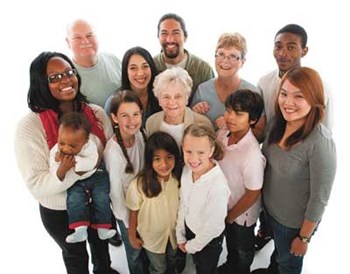
New Jersey has a long tradition of being culturally diverse, and that tradition continues to evolve today. New Jersey's Gold Coast has large populations of Asian, Indian/Hindi and Hasidim. Other areas have large populations of Pakistani and Middle Eastern, in fact Paterson, New Jersey has the second largest Middle-Eastern community in the United States. Additionally, the Garden State has a large and thriving Latino community. As these communities continue to grow so does the need for housing.
Property managers and boards can do a lot to cultivate and maintain a strong sense of community in a condo or association as demographics change over time, whether the shift is generational, ethnic, or socioeconomic. This includes everything from acknowledging holidays, being sensitive to different cultures, and working to improve everyday communication and interaction among all residents.
Elaine Warga-Murray, AMS, CMCA, PCAM, of Regency Management Group, LLC, in Howell, New Jersey says, “We have seen some communities embracing the differences by having ethnic cooking nights and themed dinners open to the community members to bring in 'tastes' of different cuisines.”
Edward Corless, vice president, lifestyle services at Wentworth Property Management, National Lifestyle Division in Eatontown, New Jersey agrees suggesting that some associations and condos form, “a welcoming committee and a social committee to host events during the year. The welcoming committee would obviously greet new residents to the community. A social committee can throw certain events during the year. [These events would] introduce the culture.” Events like these go a long way to building a harmonious community bridging cultural gaps. “ If you can bring people together that are different and if they have a good time together, they walk away friends. And no matter how different they are, if you can manage to get people together and get them to have a good time, it really breaks down a lot of barriers,” says Corless.
Meeting Challenges, Making Changes
Living in a condo or co-op community is very different from living in a single-family home or a rental building, and many—if not most—new condo owners need a period of adjustment to get used to the "condo lifestyle." Things like house rules, maintenance fees, and upstairs neighbors can be sources of friction for any newcomer, but when the newcomer is coming from another country or culture, it may take more time—and sensitivity on the part of building administrators—for them to understand and buy into their new community's protocols.
“Specifically, we have communities, such as Indian, Latino and Hasidic whose needs might be different from traditional 'western' cultural habits,” says Murray. “Each community has their own particular adjustment protocol, however the communities with the highest density or 'closest proximity' to other units have the most accommodations to make. Specific cultures have cooking, traveling, and language challenges. Apartment buildings and condominium apartment-type communities come with their own set of interior space usage issues; and then the use of clubhouse or public spaces also have to be adapted to meet resident needs.”
Each case may be different, but a good manager will move slowly and work closely with these residents to help them understand the condo protocols and processes for the community and assist them in adapting so they can quickly become part of the overall community.
Nothing is cast in stone, a community grows and changes. A mid- or high-rise condo building might not have a picket fence around it, but any good condo or homeowners association will run as if it’s a neighborhood. That’s why when new people come in and suggest reasonable changes, it's in everyone's interest to give them respect and consideration.
“When anything arises concerning a change to the building, it should be addressed at the board level,” says Mabel Guzman, the president of business development and sales for Envision Real Estate, LLC, based in Chicago. “How the community gets along is largely based on order and structure from the board. For any important issues, the concerned residents should go before [the board] to discuss their thoughts and have their voices heard."
A management company may also offer advice on changes to rules, policies, and other administrative or amenity-related issues if they feel it's something that will help the community run more smoothly and harmoniously.
“Maybe a board member notes that more Latinos are moving into a building, so they want to switch to bilingual signage,” Guzman says. “That's great, but the important thing is that you have to be finite. There are fair housing laws that you have to follow.” That means, she says, that if there are three different languages spoken in your building and you make the changes for one, you may have to do it for all three.
But what if it's not three languages—what if it's six, or eight? Those could be some pretty big signs. Depending on the demographics of your building or association, it might not be practical or financially feasible to replace every piece of signage on the property to include every language spoken there.
“That’s where your management company can come in and help," says Guzman, "because they understand the laws and can educate the residents and boards so you don’t open yourself up to legal issues."
Old and Young
There are plenty of benefits to having a wide range of ages and stages of life represented in a condo or homeowners association—but mixing generations isn’t always easy. Consider for example a teenager skateboarding in the hall and nearly toppling a senior resident who is trying to make his way to the elevator. It’s important that there are rules set up to deal with a situation like this before things get out of hand and it becomes an old-guard-versus-newcomers standoff.
“The conflict between cultures and the conflict between the elderly and the young kids, the only thing you can really do about it is to create the infrastructure, give the kids a place to play that makes sense and explain it to the folks who don't like it. If they're playing in a reasonable place, a place that we've set-up and designed for it, that's the best you can do,” says Corless.
Associations should have guidelines in their rules and regulations for the use of their common grounds, and most do. Some more common guidelines include: use of by owners with dogs; wanting to paint a piece of furniture or indulge in an outdoor hobby; and so forth. These guidelines and rules benefit all owners who live there. More importantly, the association’s rules and regulations should reflect the makeup of the building. Condo associations are like little countries; each are legally similar, but other than that, each building can and should have their day-to-day operations reflected in their rules and regulations.
Some buildings have added kids clubs for children so they have a special space of their own away from the adults and older members of the condo.
“I have seen many associations set up a separate space for kids to go to hang out," Guzman says. "It alleviates the stress of kids being around the clubhouse or hallways. By not ignoring the children and letting them know they are part of this community and have a space where they can interact and have a good time, I believe it’s the best approach.”
Plus, the combination of old and young often makes for a stronger building.
Strife Brought On by the Economy
Community diversity, does not just mean the ethnic makeup or age of the tenant; it also encompasses the economic base of the building. Since the recession, the economic makeup of a building has had a tremendous impact on the community. Due to the downturn in the economy many buildings are seeing foreclosures, short sales, FHA financing, etc. occurring and these economic factors affect the resale value of everyone in the building as well as the community.
Use Common Sense
Somewhat surprisingly, culture clashes in condo buildings and HOAs are not as big an issue as one might think. In fact, most of the experts quoted here say they have seen far more positives than negatives come from diverse cultures living in the same building, but there are some very simple yet practical measures that property managers and condo administrators can do to help a situation of cultural diversity in the building.
Most experts agree that the first and foremost skill that boards and building managers must have is the ability to listen, return phone calls and provide good customer service. It’s necessary for an association to have good, reliable, productive and knowledgeable employees as well, and for the employees to be open to dealing with everyone equally.
According to a recent report, “Open to All?: Different Cultures, Same Communities,” produced for the Illinois-based Interfaith Housing Center of the Northern Suburbs, “There are many ways a suburban [association] can create a more inclusive, welcoming and supportive community for its immigrant residents,” the report says. “With regard to housing, local government should reach out to immigrant groups....and engage and involve immigrants in local government.”
Most people—even the most fair-minded and outgoing—are somewhat resistant to change, particularly where their neighborhood or community is concerned, but establishing and maintaining peaceful friendliness among condo residents is a simple formula: Adopting rules that are of common interest to everyone, holding social events to encourage community spirit, and being fair and transparent in enforcing all rules and regulations. And that's a formula we all can live by.
Keith Loria is a New York-based freelance writer and a frequent contributor to The New Jersey Cooperator. Editorial Assistant David Chiu contributed to this article.





Leave a Comment